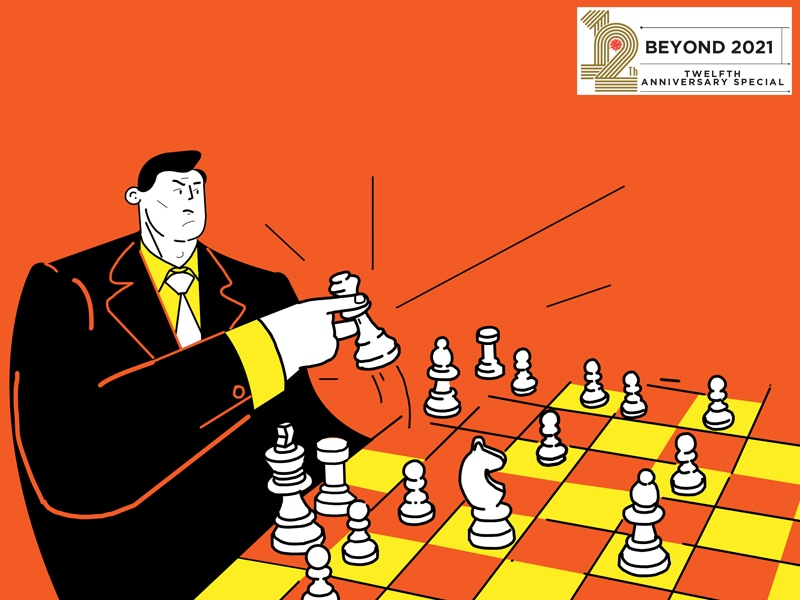Resilience is the future of leadership: CP Gurnani
To navigate times of crises, leaders need to be able to wear many hats in order to guide, inspire and innovate


 Illustration: Sameer Pawar
Illustration: Sameer Pawar
 The coronavirus outbreak started a war that united the world in a unique way, and it has been testing the resilience of all nations and economies. Businesses of all kinds have been forced to adapt to remote work, reconfigure physical workspaces, revise logistics and supply networks in order to cope with the unprecedented changes brought about by the pandemic.
The coronavirus outbreak started a war that united the world in a unique way, and it has been testing the resilience of all nations and economies. Businesses of all kinds have been forced to adapt to remote work, reconfigure physical workspaces, revise logistics and supply networks in order to cope with the unprecedented changes brought about by the pandemic.
Though it has spread panic across the globe, it has also demonstrated and made us understand the significance of crisis management, business continuity and resilience. It served as a lesson for businesses across the world to find opportunities amidst uncertainties. To survive and thrive in this new world order, we need to dismantle the known order to discover new capabilities. It calls for leaders to be focussed, and yet open to revisiting strategies, taking bold risks, and being agile and nimble—with people at the centre of every decision. I believe that this has been possible because leadership is not just a single role rather, it is a dynamic combination of roles across disciplines.
Leaders as Wartime Generals
I believe that the pandemic necessitates business leaders to take a leaf out of the military book and move from being ‘Peacetime Leaders’ to ‘Wartime Generals’. The enemy, in this context, is the virus, and globally we are leading the combat against it, together. The scale and complexity of the situation are daunting, and the stakes are high. We need the skills to attack (convert opportunities) as well as defend (mitigate threats).
Military leaders are skilled in managing various circumstances. From fighting wars in unimaginable circumstances, to conducting emergency operations, and providing relief to troubled civil societies—the armed forces do it all. Taking a cue from them, CEOs, CFOs and business leaders should hone their risk-assessment abilities to decide on the required action in real-time. It is encouraging to see leaders taking important decisions with speed, under pressure, and with no known templates to work on. Organisations have re-prioritised their strategies and sought the help of technology partners for business continuity and protecting stakeholder engagement, as we remain connected even when we are compelled to remain physically distant.
Leaders as Futurists
Now, more than ever, rapid technology-enabled innovation is imperative but I believe that creating and sustaining an innovative culture is not so easy it requires discipline and motivation. Armed with discipline, tolerance for failure and a willingness to experiment, businesses that ‘keep trying’ are sure to gain success in overcoming the obstacles created by Covid, or any other challenge for that matter. The world is on the cusp of the greatest period of transformation, and technology is the force multiplier for this change. In order to completely leverage this, leaders must also be futurists. It is no longer about what they know now rather, it is more about what they know about the ‘next’. Continuous upskilling is a necessity for this and leaders should keep themselves updated on every new technology and sharpen their skills accordingly. Only then will they be able to create opportunities for upskilling their employees in the right direction for the organisation. When legacy systems are under strain, new and unusual ideas are created, which prove to be of tremendous value. Today, the world is drawing heavily from new technologies and innovative approaches that are the ‘arsenals or firearms’ needed to emerge victorious from this war. Digital is the centrepiece of the recovery puzzle we are all attempting to solve. It was heartening to see how IT and digital startups rose to the occasion, during the peak of the first wave of the pandemic, innovating and solving problems on the go.
Leaders as Engineers of Human Relations
Organisations must invest in building morale, mental health and family stability, which form the core of a healthy and progressive society. The stress of a crisis has the potential to explode existing personnel issues or create new ones. The entire organisation should have values, empathy, and a purpose, which can keep them positive even in times of adversity.
It is important for leaders to be humane and boost employee morale. Involving remote workers, and lending them a patient ear while helping them to overcome feelings of anxiety that an uncertain situation entails, is imperative. Confidence is like a muscle. The more you build it, the stronger it gets. As we battle to keep businesses afloat in a contactless world, leaders need to equally focus on building confidence, empathy, and trust among employees. No matter which century we are in, human engineering skills and empathy will always be the core trait of leadership without them, a leader can never lead, as they form a foundation from which a team builds faith in the leader.
Leaders as Artists of a Diverse and Inclusive Workplace
Leaders need to understand and appreciate new cultures, actively seek diverse teams, lead employees with different backgrounds, and have the know-how to foster creativity and disruptive thinking, which in turn will help the organisation to deliver meaningful customer experience across the world. Diversity and inclusivity at the workplace are instruments for growth we should value and celebrate the uniqueness of every individual. As technology continues to accelerate, it is imperative to paint the workplace canvas with employees across all ages, genders, races and disciplines to ensure the survival of a business in terms of their ability to ideate, innovate and collaborate. It is therefore important for businesses to invest in diverse human capital and leverage their ideas and approach to make better quality decisions.
Leaders as Grandmasters of Resilience
Leaders constantly reassess and redefine plans and actions to prevent crises and manage them efficiently when they happen. This also requires training employees for emergency responses, and to adapt to changing circumstances. Uncertainty is inevitable in many spheres of life, no matter how psychologically painful it may be. A leader creatively finds opportunities from them and checkmates them. The resilience that businesses thus develop in the face of disruption can provide a new foundation for growth and success. Victory brings joy to all—even more so, collective victory—and behind every victory there will always be a sea of uncertainty that the team has had to overcome, to become a stronger, more confident and resilient unit.
â— The writer is managing director and CEO of Tech Mahindra
First Published: May 14, 2021, 14:32
Subscribe Now